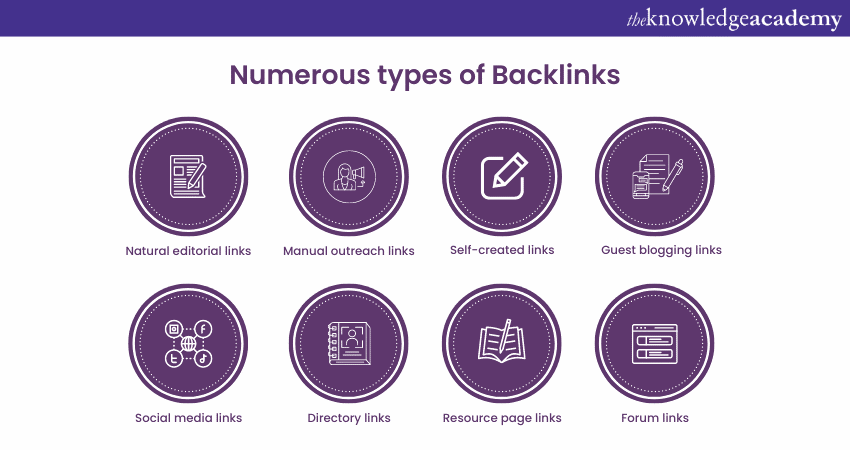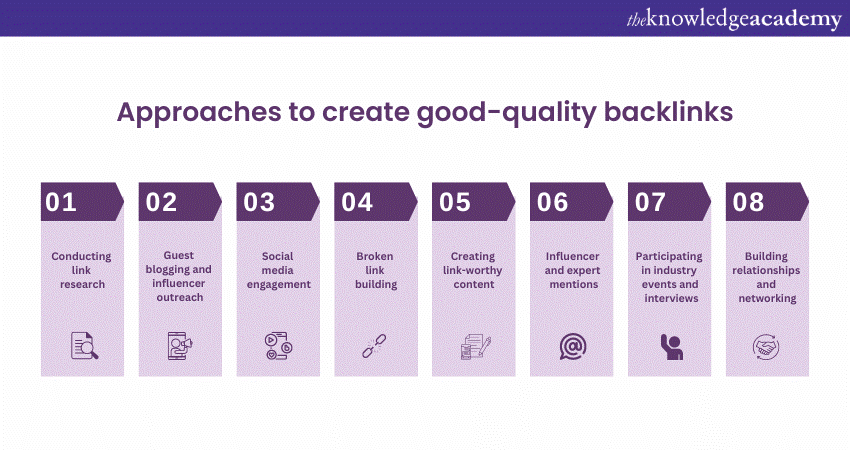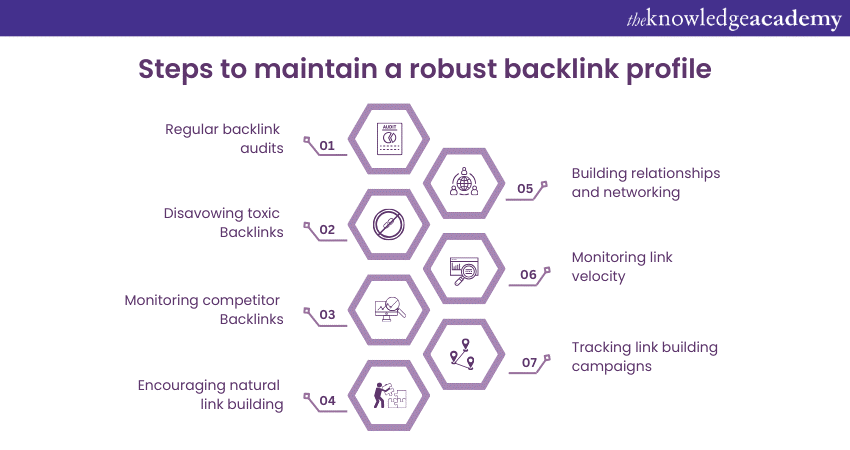We may not have the course you’re looking for. If you enquire or give us a call on 01344203999 and speak to our training experts, we may still be able to help with your training requirements.
We ensure quality, budget-alignment, and timely delivery by our expert instructors.

Are you struggling to improve your website's search engine ranking despite your best efforts? Have you invested time in creating quality content, only to find that your site is still not attracting the traffic it deserves? It can be incredibly frustrating to see your hard work not paying off, especially when your competitors seem to effortlessly rank higher. You might be wondering what they're doing differently and how you can close the gap. The answer could lie in building effective SEO Backlinks to boost your site's visibility and authority.
Read this blog to learn the importance of SEO Backlinks, how they work, and strategies to acquire high-quality backlinks that can propel your site to the top of search results.
Table of Contents
1) Understanding what are SEO Backlinks
2) Importance of Backlinks in SEO
3) What are the types of Backlinks?
4) How to build good-quality Backlinks?
5) How to maintain a healthy Backlink profile?
6) How to get Backlinks to your site?
7) Conclusion
Understanding what are SEO Backlinks
SEO Backlinks play a major role in influencing any successful Search Engine Optimisation (SEO) strategy. It refers to the incoming hyperlinks from other websites to your own. This strategy also signifies the relevance, credibility, and popularity of your website to search engines.
Backlinks are like recommendation links from other websites evaluated by search engines as a quality measure of a site's credibility. It is a key factor for websites to increase their ranking in the Search Engine Result Pages (SERPs).
Quality and quantity of backlinks are very important when search engines determine the authority and importance of a website. Websites that have more good quality Backlinks have an added advantage and always feature first on the SERPs.
Moreover, building a strong Backlink profile requires a strategic approach. It involves acquiring Backlinks from reputable and relevant sources within your industry or niche. This can be achieved through various methods, such as guest blogging, influencer outreach, social media engagement, and creating link-worthy content. Understanding the advantages and disadvantages of SEO can help you decide how to approach backlink building effectively.
Importance of Backlinks in SEO
SEO Backlinks are one of the most necessary core aspects that influence the ranking and visibility of a website in SEO. You cannot achieve your SEO goals without understanding the importance of SEO Backlinks. Some key points indicating the importance of SEO Backlinks include:
a) Better search engine ranks: Backlinks are akin to a vote of confidence from other websites. Search engines consider it an indication of relevancy and authority for a website. Websites with more good quality backlinks will be ranked higher in the SERPs for related keywords.
b) Increased organic traffic: Backlinks from high-profile sites help you earn organic traffic. When the user tends to come to a Backlink on a high authority site, they generally click more. Thus, traffic is gained, and the opportunity for conversions is also derived.
c) Authority and credibility: Quality backlinks to your website from authoritative sites in your industry or niche build your website as a pool of trusted information. Search engines recognise this as an endorsement that boosts the website's authority and credibility.
d) Faster indexing: Backlinks enable search engine bots to find and index your website much faster. Moreover, when these search engine bots crawl the web and hit upon your backlinks, they follow that link to get new pages and also update the indexes.
e) Referral traffic: The Backlinks serve as tracks that direct users from one website to another. When a reputed website links to your content, you stand a better chance of its users clicking through to your site, producing referral traffic.
f) Niche relevance: In SEO, links from websites within your industry or niche carry more weight in Search Engine Optimisation (SEO). Such a link would point out that your website connects users to worthy and valuable content within the specific topic.
g) Diversification: A diversified profile of backlinks, on the other hand, means having links from different sources such as blogs, news sites, and social media sites, showing the popularity of your site across different channels to the search engines. This greatly adds up to your overall SEO Strategy.
h) Social proof: Backlinks offer a sort of social proof for your site regarding its quality and trustworthiness. When reputable sites link back to your content, the backlinks tell the user and search engines that your site is indeed valuable, reputable, or useful.
Learn SEO strategies and improve your website’s success by signing up for the SEO Course now!
What are the types of Backlinks?
There are different types of backlinks in SEO, each different from the other based on their characteristics. Understanding them is important for the formulation of a complete SEO strategy. Here is a complete elaboration of the different types of backlinks:

a) Natural editorial links: Natural editorial links are the holy grail of SEO Backlinks. These are the links provided by third-party websites through organic means without any force on them or involvement from your side. It usually appears when other webmasters find some valuable piece in your content and voluntarily link to it. Natural editorial links weigh a lot and become serious endorsements of your website's quality and authority.
b) Manual outreach links: A manual outreach link is a proactive effort, such as contacting website owners, bloggers, or influencers and asking them to link back to your content. This method requires outreach by a person, relationship building, and persuasive communication towards the owners. When successful, these links can provide valuable exposure and referral traffic.
c) Self-created links: Self-created links are the links you create. For example, these can be made in forum signatures, blog comments, or user profiles on social media sites. Although these may contribute to the backlink profile of your site, self-created links generally have a lot less value in the eyes of search engines compared to natural editorial or manual outreach links. Self-created links should be used with great care, and you should use only relevant and high-quality links.
d) Links in Guest blogging: Guest blogging means posting articles on websites that are in your industry or niche but not owned by you. In return, you may add a Backlink to your website within the author's bio or in the content. As a guest blogger, you have the opportunity to demonstrate your expertise and extend your reach to a totally new audience. This includes getting some high-quality SEO Backlinks from the most authoritative resources.
e) Social media links: This kind of link might become one of your sources for good quality Backlinks. This encompasses the Backlinks generated through your social media platforms, which occur as the content from your website is circulated by various users. Social media profiles will usually let you add some form of a website link in your bio or about section, providing another opportunity to create SEO Backlinks.
f) Directory links: Directory links are links in directories obtained from online websites of directories or listings. The directories are classified by industry, location, or other criteria. Though some directories might be of low quality or spam, listing your site in relevant and reputable directories might have some value in terms of your SEO.
g) Resource page links: Resource pages are web pages that consolidate and list the resources found useful for industry or topic use. Acquiring Backlinks from resource pages can provide great outreach facilities, as these pages are considered authoritative and useful.
h) Forum links: Engage in online forums related to your industry or niche. It can enable you to include links to your website within your forum posts. However, it's important to engage genuinely in forum discussions and avoid spammy practices, as search engines are adept at recognising manipulative link-building.
Learn the best practices for optimising your landing page by signing up for the Landing Page Optimisation Training now!
How to build good-quality Backlinks?
One very basic thing to consider in any successful SEO campaign is building quality Backlinks. These high-quality Backlinks from your site will not only help you raise the search engine rankings of your website but also help you drive the targeted traffic and enhance your online visibility. Here are effective methods to build quality Backlinks:

a) Conducting link research: Conduct comprehensive link research as a first step in identifying websites and online resources most relevant to your industry or niche. Analyse their Backlink profile and work on grabbing opportunities to get those Backlinks in SEO. Look for relevant websites with high domain authority to maximise the impact of human quality on your Backlinks.
b) Guest blogging and influencer outreach: Another way of doing great things is to contribute as a guest blogger on famous sites in your respective niche. Explore opportunities for guest blogging on the blogs of influential bloggers, owners of websites, and industry experts. They have an audience, and every well-written post for their site will give you quality Backlinks.
c) Social media engagement: Engage with the potential audience on social media platforms that might bring forth valuable SEO Backlinks. Distribute your content, get involved in industry-related conversations, and connect with influencers and thought leaders. When users are truly captivated by content, they are likely to share it, naturally resulting in the creation of organic Backlinks.
d) Broken link building: Identify some broken links on the web pages of leaders and authorities within your industry. In addition, you must find the website owners with the broken links and kindly request them to, if possible, have it replaced with one that points to your similar relevant content. It works as a win-win for both the parties involved; you help them enhance their website user experience and get a backlink in return.
e) Creating link-worthy content: Create high-quality, informative, and interesting content that would be useful for other players in the industry or niche. If you create some kind of link-worthy content, other websites might refer to it and, therefore, link to it. This could be something very comprehensive that includes the in-depth guides, research studies, or infographics to original data that provide unique insights.
f) Influencer and expert mentions: Include influencers and experts in the content and notify them about it. It can lead them to link to or share your content with their audience if they consider it valuable. This can significantly boost your visibility and attract high-quality Backlinks from authoritative sources.
g) Participation in industry events and interviews: These could be in the form of webinars, conferences, etc., where you get a chance to share your knowledge and insights. Often, these events will have a website associated with them that contains speaker profiles or summaries of the event itself, giving them an opportunity to obtain a Backlink.
h) Relationship building and networking: Strong relationships with other people from your niche are terribly important. It is almost impossible to obtain backlinks without it. Attend industry meetups, be a part of skilled teams or communities relevant to you, and actively build your network. Building real links can lead to opportunities through collaboration, partnership, or recommendation.
Learn to identify industry trends and visitor engagement by signing up for the Google Analytics Certification now!
How to maintain a healthy Backlink profile?
A healthy Backlink profile is important for becoming successful in SEO. Continuous Backlink Analysis, monitoring, and management are needed to ensure that the Backlinks to your website point to high-quality and relevant sources. Here are a few ways in which companies can ensure that they stick to a healthy Backlink profile:

a) Regular Backlink audits: Regular audits of SEO Backlinks help identify low-quality or toxic links that might potentially hurt your website ranking. Use free tools like Google Search Console and Bing Webmaster Tools or a third-party Backlink analysis tool to check the quality, relevance, and trustworthiness of the site your Backlinks are coming from. It might also be a cause to safeguard your website's reputation by removing or disavowing the toxic or irrelevant Backlinks that are associated with it.
b) Disavow toxic Backlinks: If you find out that some of your Backlinks are toxic or spammy, disavow them by using the Google Disavow Tool. This simply tells search engines not to count those particular Backlinks in their assessment to rank your site. You have the option to reject harmful or unsolicited Backlinks, thereby protecting your website from any possible effects these backlinks could have on your SEO results.
c) Monitoring of the backlink profile of a competitor: Check the profile of Backlinks for competitors. Don't forget to monitor both their sources and quality to nail potential options for your own link-building campaigns. If your competitors are getting Backlinks from authoritative and relevant sources, reach out to them or look for the same opportunity in your niche.
d) Help in natural link-building: Create valuable, high-quality content that will attract Backlinks by nature. When the content is good enough and worthy enough for interactivity with your audience, other sites will link to the content; this will happen organically through your efforts to gain those links. Add social share buttons and relevant internal links that would contribute to a higher potential for your content to be shared and linked to. Quality content can be given priority, thus increasing the chances of organic link-building.
e) Building relations and network: Build relations with influencers, thought leaders, and other sites in your industry. Join events from the industry and be part of online communities. Real connections might help you gain high-quality Backlinks through collaboration, partnership, or recommendation opportunities.
f) Link velocity monitoring: Monitor the number of new backlinks that are being added to the website. A sudden and unnatural spike in the Backlink graph shall throw a red signal to the search engines. Aim for a steady and organic link velocity showing constant growth. A very sudden spike or drop in Backlink acquisition might signal manipulative practices or low-quality link-building techniques.
g) Link monitoring campaigns: Track efforts to build links besides tracking the performance and effectiveness of strategies, including guest blogging, influencer outreach, or content promotion. Analyse the results of the built Backlinks and, if needed, adjust your strategy to lay greater emphasis on methods that yield better results.
Learn to identify industry trends and visitor engagement by signing up for the Google Analytics Course now!
How to get backlinks to your site?
Not all Backlinks are of equal quality. Therefore, you need to implement some Backlink strategies to achieve your SEO Backlink goal. Here are some of the best Backlink strategies that bring impressive results to your website.
Targeted link outreach
Do you want to be a link building wizard? Then, prepare to master the process of outreach that can include anything from writing guest blogs and syndicated articles to fixing broken links or even targeting link insertions of some form or another.
As outreach is a way to reach out to other site owners and ask for Backlinks, then this is an art form that changes all the time. After all, generic outreach email templates in the past were still enough to pick up some Backlinks, but they are far too impersonal these days.
The secret is long out when it comes to link-building, so getting hundreds of outreach emails from hungry link-builders is the norm for most site owners, especially those with strong DA. So, if a site owner sends you a generic outreach template that does nothing more than beg for link placement, don't be surprised when it finds its way into the trash folder, unopened and unread. Make it human: If you want the people you're reaching out to as part of your outreach targets to open your emails, you must be creative enough.
Targeted outreach tips
Your subject line is probably the most important part of any outreach email and where you need to really knock it out of the park.
First of all, you never want to use subject lines that look like this:
1) Guest post idea
2) Article syndication opportunity
3) Link to my Press Release?
4) Can you insert one of my Backlinks?
These are subject lines so vague they sound like desperate laziness. Most importantly, they give nothing to the site owner. So, before you write an outreach email, ask yourself, "What's in it for them? What would make them WANT to add a link to my site?
Another great tip: Tell a story with your subject line (without being too wordy). For example, you want to write a guest post about the bugs that appeared with Google.
Google’s October Core Update is affecting the Google Discover traffic
Interesting, for sure, and definitely relevant to any website posting news in the SEO category.
Yet, your subject line will make or break your opportunity to write it, so you must construct it carefully. Here's an example of an exciting email subject line that tells a story:
Google’s October Update Bug Spells Trouble for Google Discover Traffic
Include your pitch as the subject line, and the site owner immediately knows what your angle is for the guest post. This enables them to save time. Moreover, a subject line like this makes them read on and, therefore, opens your mail for your pitch to read completely.
Relationship building
This tactic really put in serious work. But you must understand what is relationship building, and what does it have to do with getting links back. The bottom line is that, rather than reaching out coldly to hundreds of sites (each for a one-off backlink), it makes much better sense to form long-lasting relationships with a few websites close to your own.
This approach is so potent since it leads to building very many links from each site, not just one. Also, you will continue building bridges with these websites for many years. Building a relationship with another website in your field isn't the easiest thing in the world to do. In contrast, relationship building has much more nuance and subtlety.
Link insertions
Link insertions have gained serious momentum in recent years for plenty of good reasons. A link insertion is when one reaches out to a site owner inquiring about the possibility of having one of his or her links inserted into an existing piece of his or her content on the site. In other words, instead of starting from scratch with a new guest post, all you have to do is give the site owner a link to the URL of the Backlink you want.
Though nothing new, this was definitely not a widely accepted practice of Link Building due to its negative stigma attached. Before adopting the moniker, the approach was referred to as "link begging.
SEOs didn't want to come off as panhandlers, and therefore they stayed away from putting links in for years. It all changed when these prevalent bloggers showed the effectiveness of the technique and the unique benefits link insertions offer.
In the eyes of Google, there is hardly a difference between whether the link comes from a guest post or an insertion, as long as the site that houses that link is very trusted and authoritative. What's more, link insertions take much less time than guest posts to make an effect on your SEO profile. That's because, with link insertions, you are inserting one of your links into an already existing piece of content that's indexed in Google. For that sole purpose, you would want to take notice of sites with rankings near the top of the SERPs when searching for link insertions.
Press releases and article syndication
Is your company about to face some huge change? Are you preparing to change the CEO soon or add one more department to the list? So, you see, you can actually leverage these by creating press releases for your SEO. Besides making announcements about company news and building brand awareness, press releases are great ways to gain Backlinks.
This strategy dovetails with relationship building because you will need to have an established network of news websites and media outlets to serve your press releases. The only thing to remember is press releases are not for announcements of time-sensitive events or promotions.
Beyond that, any development at your business is fair game, so feel free to start producing press releases in order to enlarge your reach and acquire backlinks. Another way to do article syndication is through a service that is excellent for improving your online visibility and acquiring Backlinks. In fact, with press release syndication, you really do not create new press releases at all.
Creating linkable assets
Finally, great content attracts more links from other websites, and it is also shared more on social media. Some content collects a lot more shares than others. They are most productive when it comes to shares, as they generate long-form posts.
Bloggers constantly search the Internet for visually appealing infographics to share. All of them seem to want to work with a Graphic Designer to put them together. Esentially, when you're producing stellar content, build your backlink profile. This way, you would find it much easier to take the lead in dominating the SERPs in your niche.
Conclusion
SEO Backlinks remain a vital component of a successful SEO strategy. Such Backlinks hold promising opportunities for website owners and marketers in a rapidly evolving digital landscape. Companies can adapt to emerging trends and leverage their business with the power of high-quality Backlinks.
Gain in-depth knowledge of marketing to retain your customers, by signing up for the Digital Marketing Courses now!
Frequently Asked Questions
How can I acquire high-quality backlinks for my website?

To acquire high-quality Backlinks, focus on creating valuable content that others want to share. Engage with relevant influencers and websites for guest posting and partnerships. Utilise tools to find competitors' Backlinks and target similar sites.
What role do anchor texts play in optimising backlinks for SEO?

Anchor texts are crucial for SEO as they help search engines understand the context of a link's destination. Using relevant and varied anchor texts optimises your backlinks by aligning with target keywords, improving your site's search rankings.
What are the other resources and offers provided by The Knowledge Academy?

The Knowledge Academy takes global learning to new heights, offering over 3,000 online courses across 490+ locations in 190+ countries. This expansive reach ensures accessibility and convenience for learners worldwide.
Alongside our diverse Online Course Catalogue, encompassing 19 major categories, we go the extra mile by providing a plethora of free educational Online Resources like News updates, Blogs, videos, webinars, and interview questions. Tailoring learning experiences further, professionals can maximise value with customisable Course Bundles of TKA.
What is the Knowledge Pass, and how does it work?

The Knowledge Academy’s Knowledge Pass, a prepaid voucher, adds another layer of flexibility, allowing course bookings over a 12-month period. Join us on a journey where education knows no bounds.
What are related courses and blogs provided by The Knowledge Academy?

The Knowledge Academy offers various Digital Marketing Courses, including the Digital Marketing Course, Search Engine Optimisation (SEO) Course, and Google Analytics Certification. These courses cater to different skill levels, providing comprehensive insights into Strategic Marketing Goals.
Our Digital Marketing Blogs cover a range of topics related to Digital Marketing, offering valuable resources, best practices, and industry insights. Whether you are a beginner or looking to advance your Digital Marketing skills, The Knowledge Academy's diverse courses and informative blogs have got you covered.
Upcoming Digital Marketing Resources Batches & Dates
Date
 SEO course
SEO course
Fri 23rd May 2025
Fri 25th Jul 2025
Fri 26th Sep 2025
Fri 28th Nov 2025






 Top Rated Course
Top Rated Course



 If you wish to make any changes to your course, please
If you wish to make any changes to your course, please


